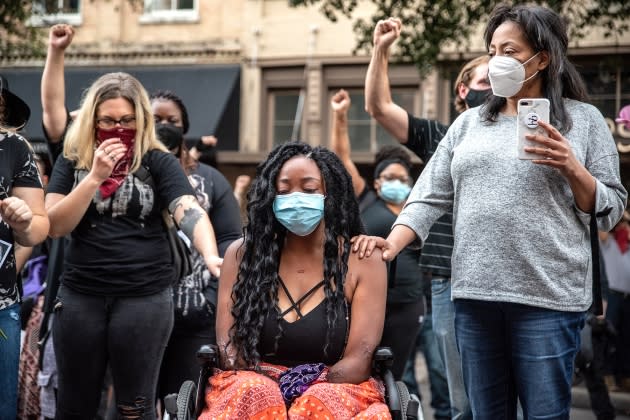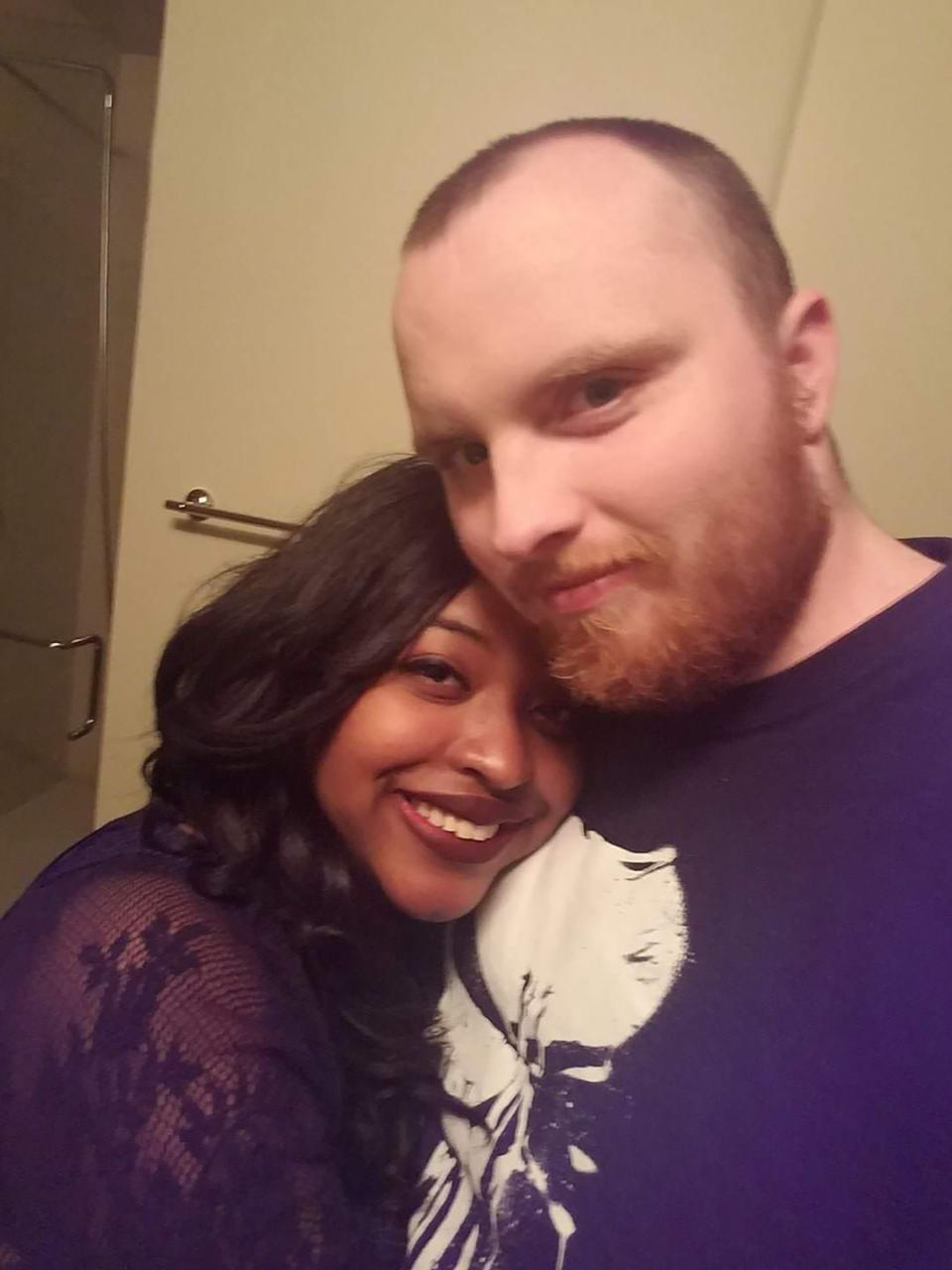‘He Didn’t Deserve It’: Widow of Murdered BLM Protester Speaks Out
- Oops!Something went wrong.Please try again later.

For Whitney Mitchell, the evening of July 25, 2020, replays in her mind over and over. It’s the day her husband Garrett Foster was shot and killed in front of her during a protest against police brutality in Austin, Texas. “It’s difficult to watch somebody that you love — who was the love of your life and your best friend and who was everything to you — die in front of you, and you can’t do anything about it,” Mitchell tells Rolling Stone.
Last Friday, a jury of Daniel Perry’s peers found him guilty of the murder of Foster, a Black Lives Matter protester, military veteran, and Mitchell’s partner of more than a decade. (Due to the length of their relationship, Mitchell considers them common-law married, although they did not officially wed before his death.) Republicans immediately rallied around the convicted murderer, who is also an Army Sergeant. On Saturday, Texas Governor Greg Abbott vowed in a tweet to pardon Perry, citing the state’s Stand Your Ground law. (Perry’s defense had been that he feared for his life at the time of the shooting.) By Monday, Kyle Rittenhouse, who in 2021 was infamously acquitted of murder in the killing of two BLM protesters in Kenosha, Wisconsin, was on Tucker Carlson Tonight, voicing his support for Perry. “He defended himself,” Rittenhouse, who fatally shot two people when he was 17, said. “He knows what he did was right.”
More from Rolling Stone
Kyle Rittenhouse Defends Man Convicted of Murdering BLM Protester
Jury Selection in Lori Vallow Murder Trial Touches on Religious Belief, Internet Misinformation
Meanwhile, Mitchell, 31, says the little closure the guilty verdict offered her and Foster’s family feels like it’s being erased. “I really don’t think that anyone is thinking about any people who are impacted by this and who loved and cared about Garrett deeply,” she says. “I can’t understand it. It’s been a really hard road to get here. It’s been a really long three years. And to go through everything that we’ve been through and now to hear what’s happening, it’s just horrible. It’s like, when you get to a feeling of being relieved, then it’s all taken away.”
The night of Foster’s killing, police said, Perry drove into a crowd of around 20 protesters in downtown Austin. Foster, who was legally carrying an AK-47 across his chest, approached the driver’s side window and said something. Through the open window, Perry fired five shots from a handgun, killing Foster. The defense argued Perry’s actions were protected under “Stand Your Ground,” because he feared for his life. Prosecutors said Perry “couldn’t keep his anger under control,” and instigated the confrontation by driving into a crowd of people.
During the trial, which lasted two weeks, Mitchell, who uses a wheelchair, testified about the night Foster died. “All I remember is hearing gunshots, and Garrett just falling over in front of me … and I jumped out of the [wheelchair],” she said on the stand.

The trial was challenging, she tells Rolling Stone. “It’s absolutely insane to have to talk about what’s happened to you with the person who has caused all of this in the room with you,” she says, referring to testifying in front of Perry. “When I got the verdict, and he was guilty, it’s a bittersweet feeling. I felt relieved, in a way, but also, it’s hard, because it doesn’t bring Garrett back.”
Mitchell and Foster met when they were 17 and living in the Dallas area. They attended different high schools but met through a friend and bonded via MySpace over their shared identities as “emo kids,” as Mitchell describes it. Within a year, he’d proposed to her, with a toy ring, because that’s all he could afford. Also within the first year of their relationship, she underwent a life-changing illness and infection that resulted in the amputation of both her legs and arms. “It was a really rough time,” she says. “I was in a coma and Garrett stayed through the whole thing…every day, every night. There wasn’t a point where he wasn’t there.” While Mitchell re-learned how to walk and function in the wake of her surgeries, he enlisted in the Air Force to earn money to support them. After his honorable discharge around 2011, he became her full time caregiver.
As a couple, Mitchell says, they’d always been interested in supporting the fight for social justice. When they faced the occasional backlash for being an interracial couple — he was white, she is Black — Foster always stood up for them. “Garrett was always online, actively debating with people,” she says. “He was always fighting for me and fighting for this relationship. We just kept living our lives and not really caring about what other people are saying.”
The murder of George Floyd in 2020 spurred them to join the protest movement that sprang up nationwide against police brutality. “He was always gonna go out there,” she says. “I can’t think of a time that we wouldn’t have done that. Seeing this go on for years, me and Garrett had had multiple conversations about it. We decided to go out and be out there and voice our concerns.”
The protests of that summer were scary. Mitchell recalls police shooting protesters with bean bags and rubber bullets and throwing tear gas canisters into the crowd. “There was so much going on, like people getting hit with batons and being maced in the face, being thrown to the ground; it definitely wasn’t safe,” she says. “That’s why Garrett was carrying.”
Since the trial began, Mitchell says she’s seen an uptick in hateful messages directed at herself and Foster, whom she says she still hasn’t had time to properly grieve. “I’ve gotten some really disgusting messages from people,” she says, including people suggesting Foster deserved what happened to him. “After it all happened, it was just awful, and now, with all this happening, it’s starting up again.”
She wants people to remember Foster for his humanity — his love of fantasy role-playing games like Warhammer and RuneScape, and his devotion to her and their pets: a snake named Lil Rick, and Beetlejuice, who is a hefty lizard known as a tegu. “Garrett was a reptile dad through and through,” she says. “I just think people forget that people are deeply impacted by this. And Garrett was an amazing person who did not deserve this. And he had the right to open carry. I just don’t understand.”
Best of Rolling Stone

